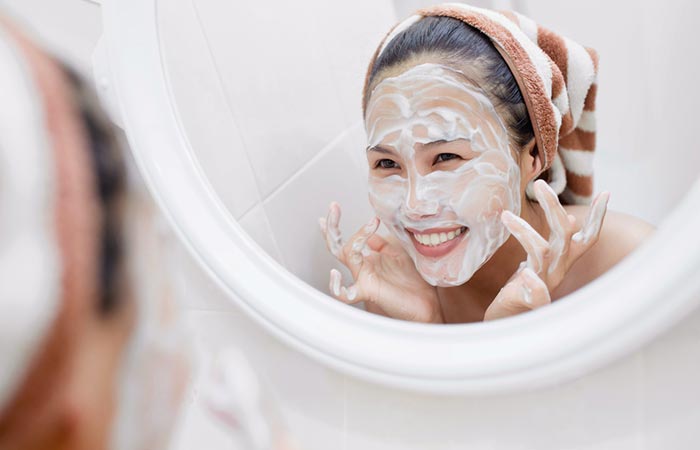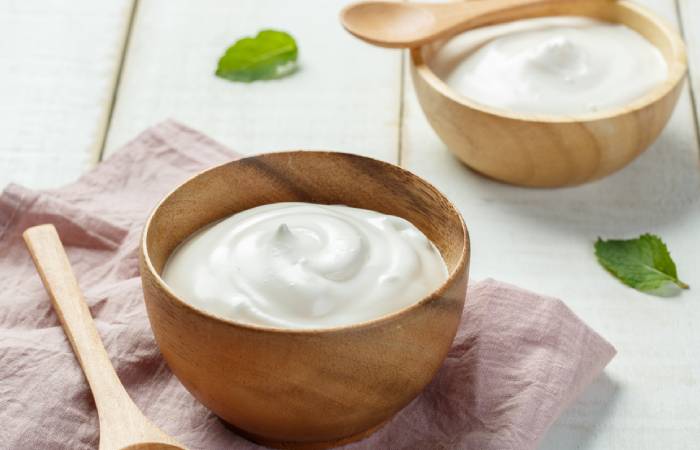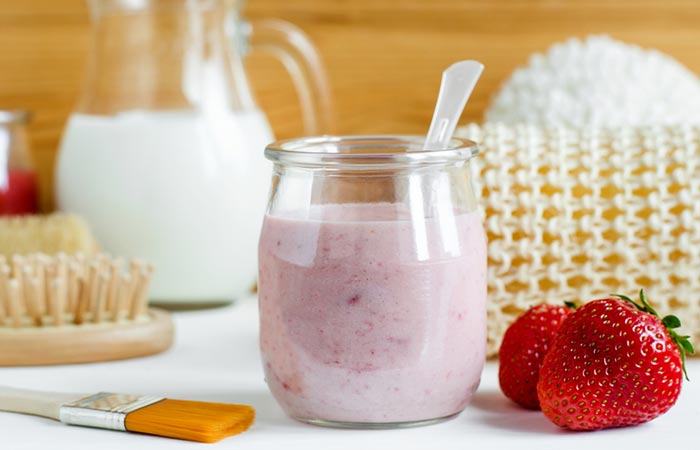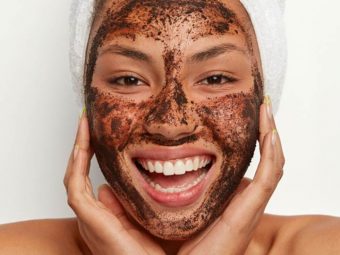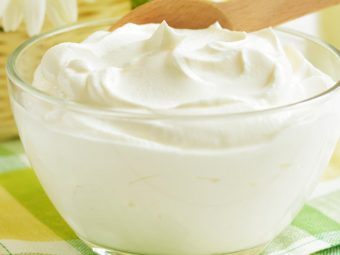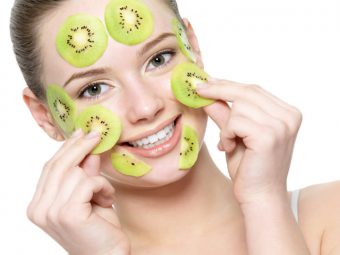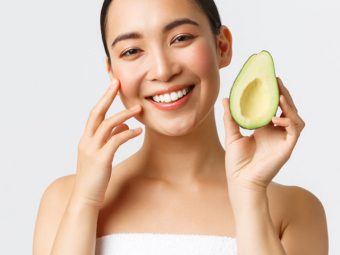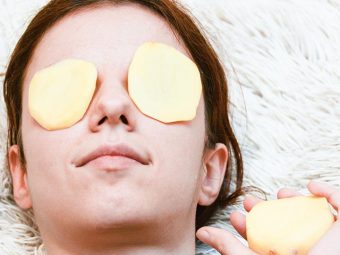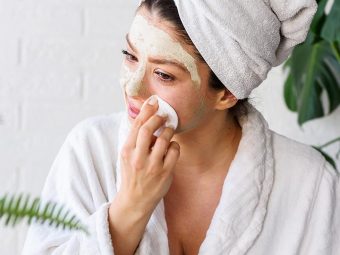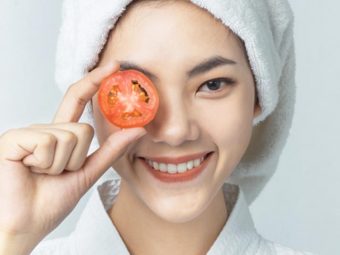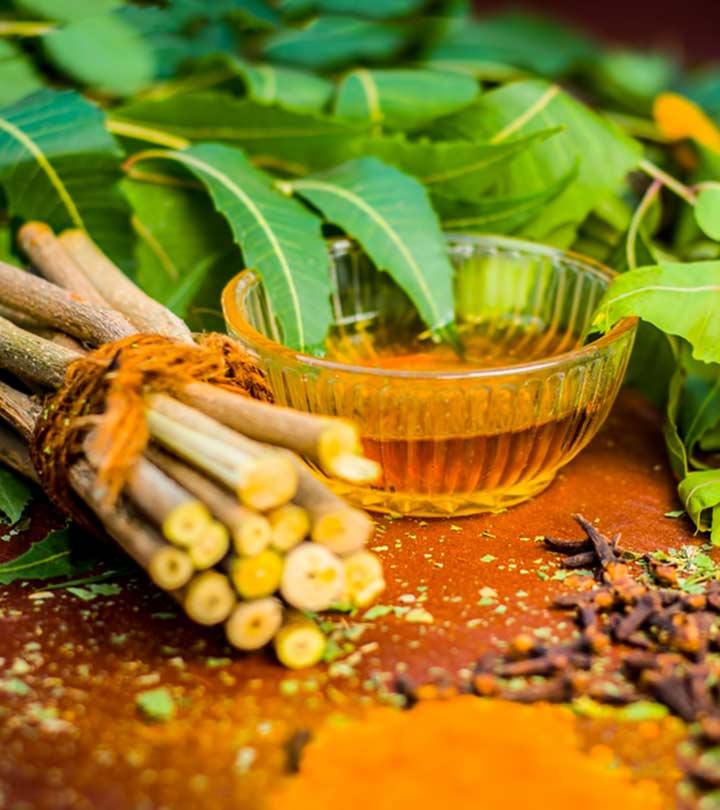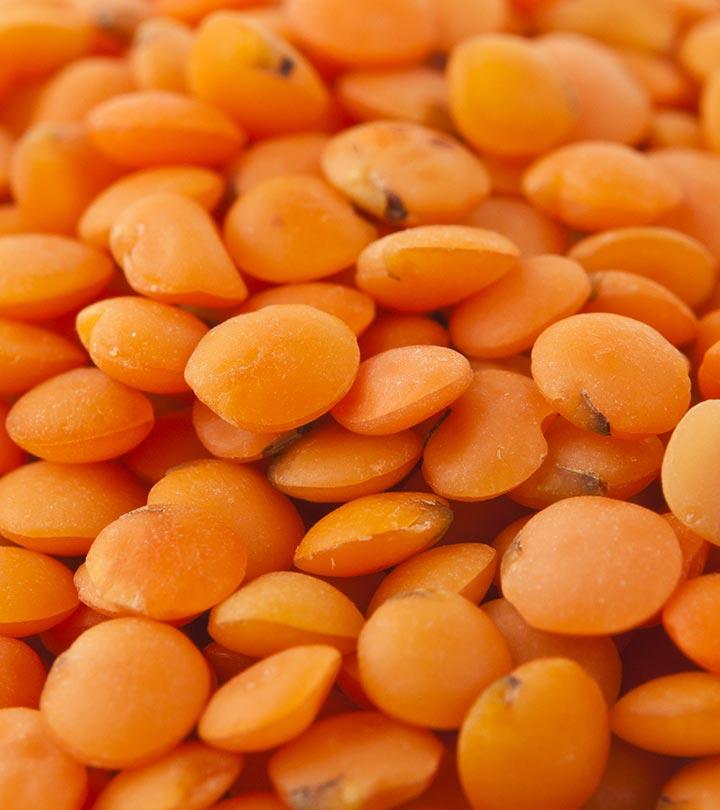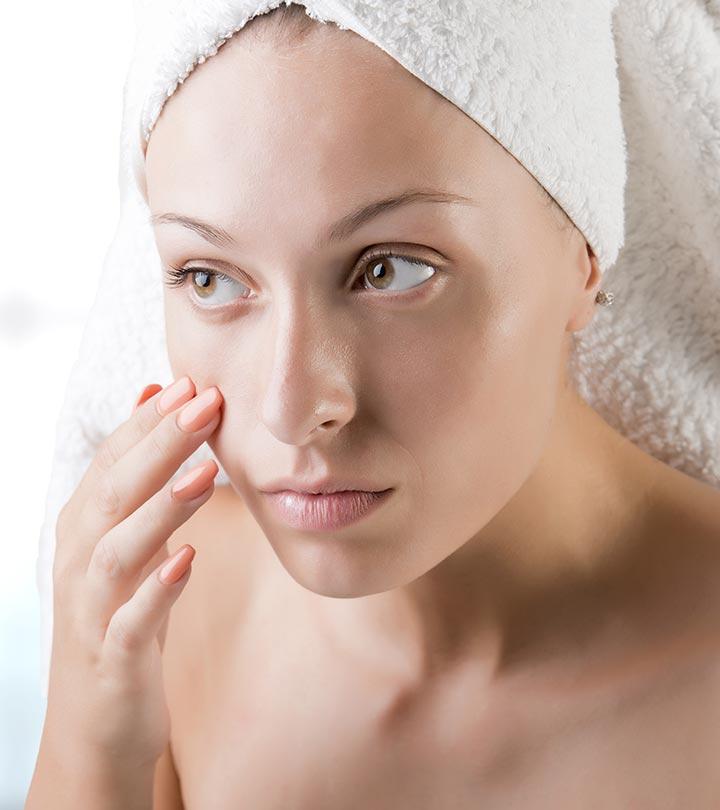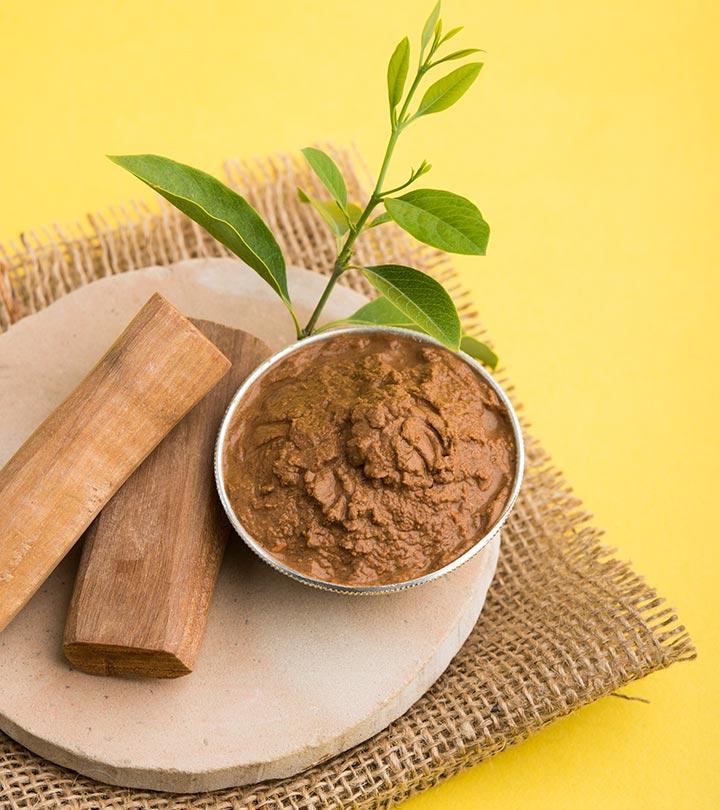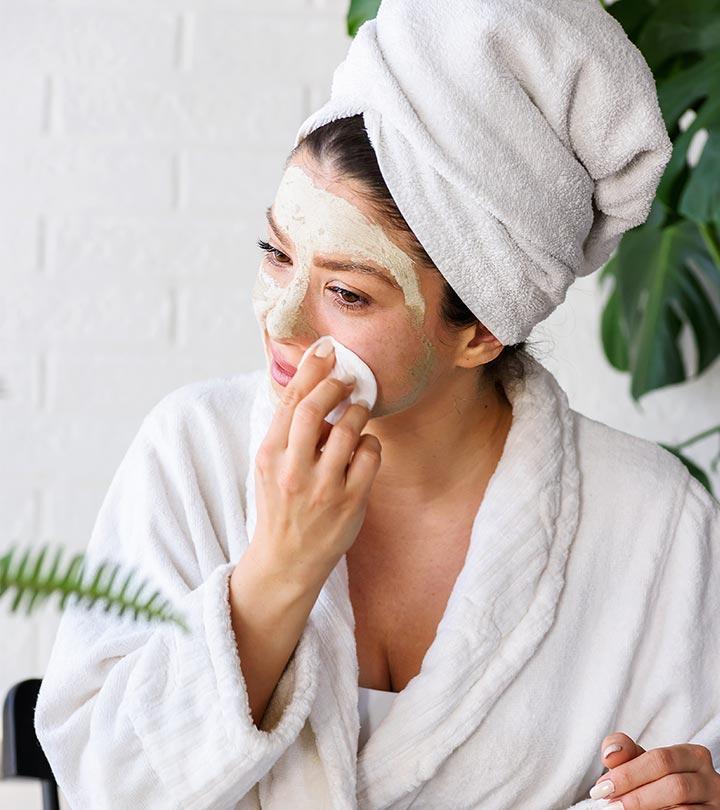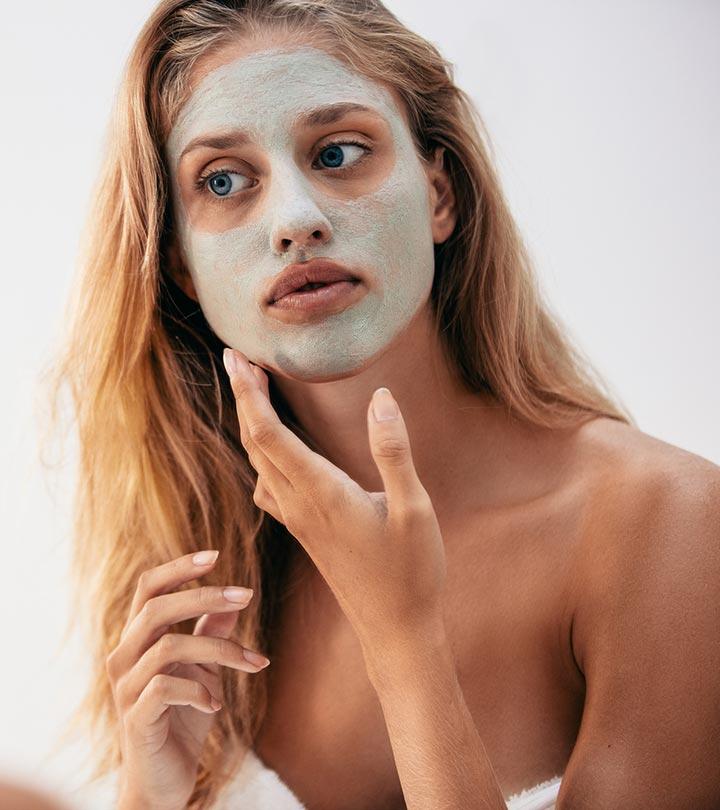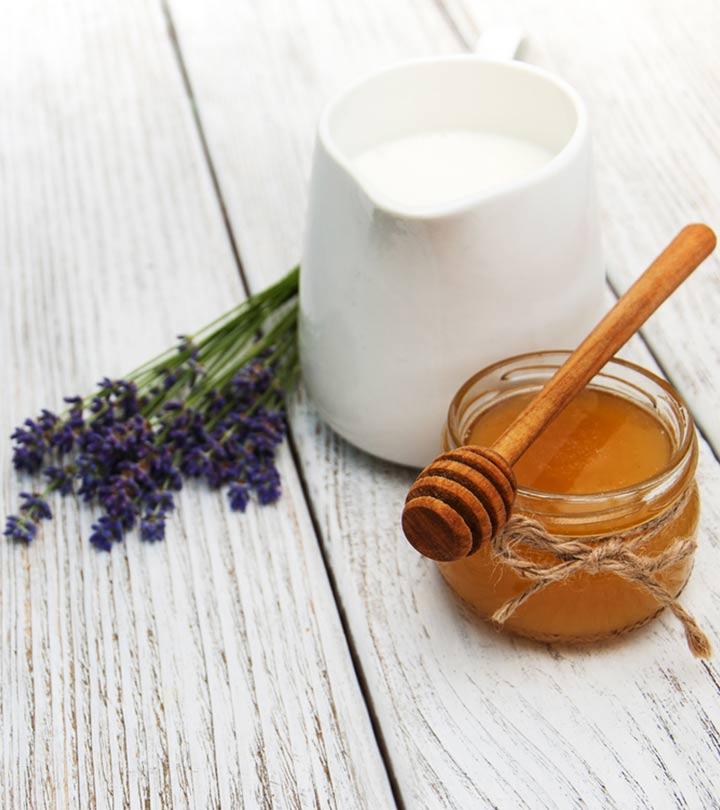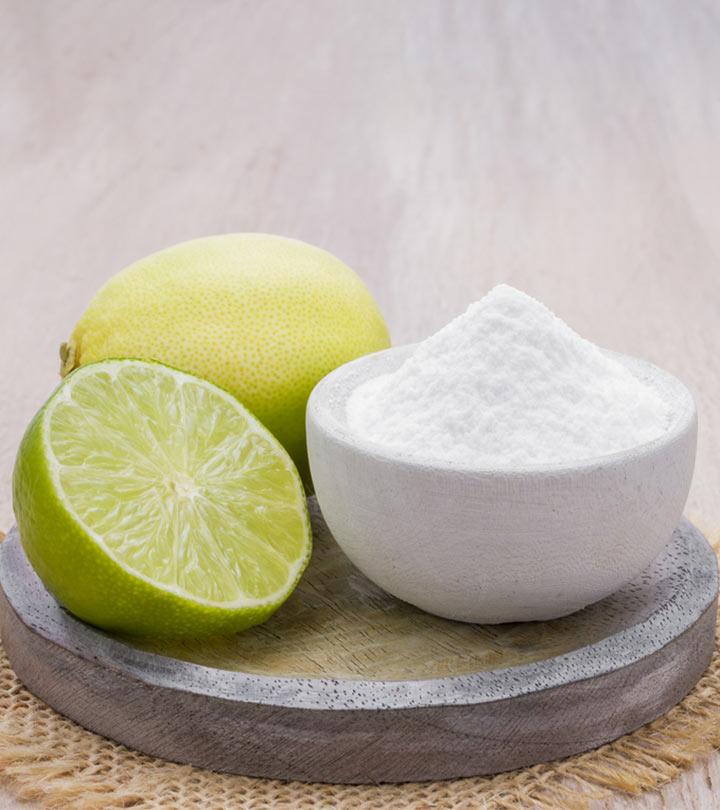Benefits Of Yogurt Face Mask
From dark circles to aging signs - yogurt face masks can address numerous skin issues.
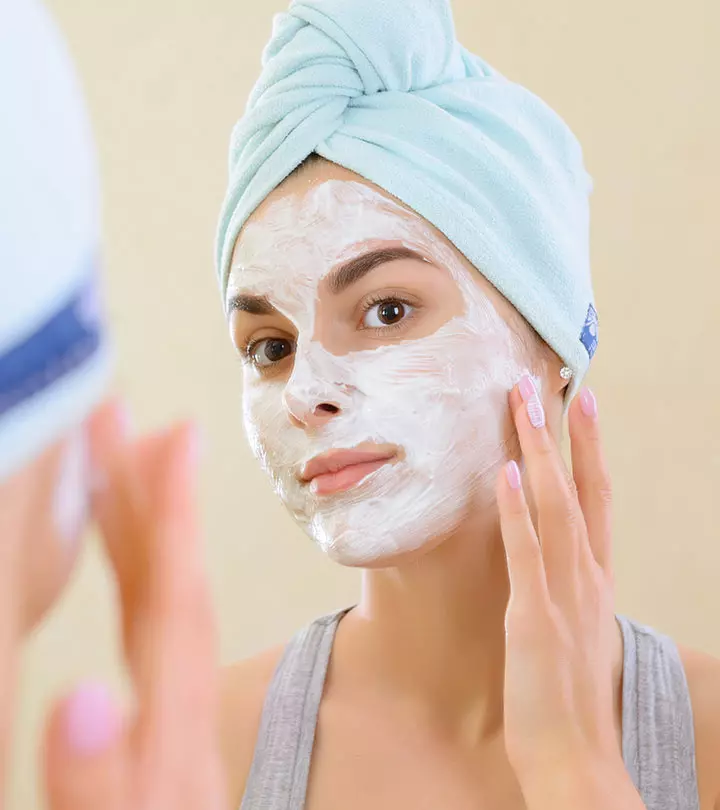
Image: Shutterstock.com
A yogurt face mask is a wonderful option for anyone who wants to incorporate yogurt into your skin care regimen. This probiotic has several benefits for your overall health. However, it can also help improve your skin health when used topically. Do you know how to use it? Read on to know the several benefits of yogurt for the skin and how to use it.
In This Article
Benefits Of Yogurt For Skin
1. Brightens Skin Tone
The lactic acid in yogurt inhibits the synthesis of tyrosinase. Tyrosinase is an enzyme responsible for melanin production, a substance that makes your skin tone dark. This way, yogurt may help enhance your skin tone (1).
2. Exfoliates Skin
The lactic acid in yogurt may help with cleansing, exfoliating your skin, and improving skin cell turnover rate (2). Additionally, lactic acid does not irritate the skin while removing the dead skin cells.
3. May Help Reduce Acne
Yogurt contains zinc. Some research shows that zinc may help treat inflammatory acne (3).
4. Helps Treat Under-Eye Dark Circles
Anecdotal evidence suggests that the zinc in yogurt may help lighten blemishes and scars. Using yogurt under your eyes may help reduce the appearance of dark circles.
5. May Delay The Signs Of Aging
Yogurt contains bioactive peptidei XSpecific protein fragments that have a positive impact on body functions or conditions and may ultimately influence health. fractions that possess antioxidant properties. These properties help fight free radicals that may otherwise accelerate aging (4).
6. Combats Skin Infections
The lactic acid in yogurt possesses antifungal properties (5). These could help combat fungal infections on your skin.
Yogurt is available as multiple types, and each offers a unique advantage. Learn more about these types in the next section.
Types Of Yogurt
1. Dairy-Free Yogurt
This is made with plant-based milk like that of almond, soy, or coconut. It is a great option for vegans or those who are lactose intolerant.
2. Greek Yogurt
Also referred to as strained yogurt, it is made by straining the excess whey from regular yogurt. This results in a creamier, thicker texture.
3. Probiotic Yogurt
It contains beneficial bacteria that are good for digestive health. This yogurt is made from milk that has undergone fermentation by probiotics like bifidobacteria and lactic acid bacteria.
4. Frozen Yogurt
This is a dessert that is made by mixing yogurt cultures, sweeteners, and different flavorings.
There is a reason yogurt face masks can keep your skin glowing and youthful. They contain powerful nutrients that are skin-friendly and soothing. In the following section, we have briefly covered the most important nutrients present in yogurt.
What Are The Nutrients In Yogurt?
1. Zinc
100 grams of yogurt contain 1 mg of zinc. This mineral is renowned for its anti-inflammatory and antioxidant properties (6).
2. Calcium
Yogurt is a good source of calcium. Calcium is known to protect the skin from the outside environment (7).
3. B Vitamins
Yogurt is rich in vitamin B2 or riboflavin. Some believe riboflavin may help keep skin hydrated and protect skin from damage caused by free radicals. However, more research is warranted in this regard.
4. Lactic Acid
Lactic acid is the key ingredient of yogurt and a good exfoliant (2).
 Quick Tip
Quick TipAre you excited to use yogurt on your face? Let us take a look at how you can use it as a face mask.
How To Use Yogurt On Your Face
1. Honey And Yogurt
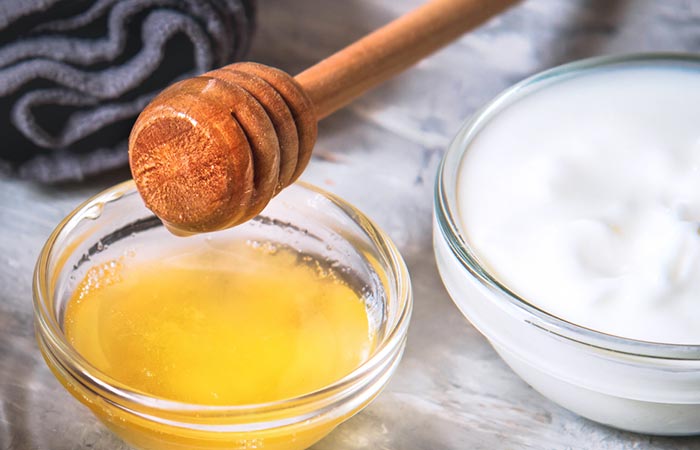
Honey contains antimicrobial and antioxidant properties that may help your skin achieve a natural glow (8),(9).
What You Will Need
- ½ a cup of yogurt
- 2 tablespoons of honey
What You Have To Do
- Mix half a cup of yogurt with 2 tablespoons of honey in a bowl.
- Apply the mask evenly all over your neck and face.
- Leave the mask on for 20 minutes and rinse with warm water.
How Often You Should Do This
Do this once a week.
2. Strawberry And Yogurt.
Strawberries act as a natural sunscreen. They contain polyphenols and vitamins that can protect the skin from UV radiation damage (10).
What You Will Need
- 2 fresh strawberries
- ½ a cup of yogurt
What You Have To Do
- Blend 2 fresh strawberries and yogurt.
- Apply the paste all over your face with a brush.
- Leave it to dry and wash with cold water.
How Often You Should Do This
Do this once or twice a week.
Jovana, a blogger, shares a DIY face mask recipe for dull and dehydrated skin, highlighting the benefits of its ingredients (yogurt, strawberries, and honey). She writes, “But the main reason I love this face mask so much is that it noticeably makes my skin bright, plump, supple and youthful (i).”
3. Turmeric And Yogurt
Turmeric is rich in antimicrobial and anti-inflammatory properties (11). It may help treat acne breakouts when combined with yogurt.
What You Will Need
- ½ a cup of yogurt
- 1 tablespoon of turmeric powder
What You Have To Do
- Mix 1 tablespoon of turmeric powder and half a cup of yogurt.
- Apply the paste evenly all over your face and neck.
- Leave the mask on for 20 to 30 minutes and wash with warm water.
 Quick Tip
Quick TipHow Often You Should Do This
Do it once a week.
4. Oatmeal And Yogurt
Oatmeal helps exfoliate your skin without causing any irritation (12). Using it with yogurt can keep your skin clear.
What You Will Need
- 1 tablespoon of yogurt
- 1 tablespoon of blended oatmeal
- ½ a tablespoon of honey
What You Have To Do
- Mix all the ingredients in a bowl.
- Apply the paste all over your face and neck.
- Leave the mask on for 10 to 20 minutes and wash with warm water.
How Often You Should Do This
Do it once a week.
5. Avocado And Yogurt
Avocado is considered a natural moisturizer (13).
What You Need
- ½ a cup of yogurt
- ½ an avocado
- 2 tablespoons of aloe vera
What You Have To Do
- Mix all the ingredients in a bowl.
- Apply the mask evenly all over your face and neck.
- Wash it after 20 to 25 minutes.
How Often You Should Do This
Do it once a week.
While a yogurt face mask can work well on your skin, you must take certain precautions.
Things To Remember
- Those with sensitive skin may experience a slight tingling sensation when they apply the face mask. Some may even experience a stinging and burning sensation. In such cases, wash the face mask immediately with water and get an allergy test done. You could be allergic to the lactic acid or probiotics present in natural yogurt.
- If you are allergic to dairy products or alphai XA group of plant or animal-derived acids used as a skincare ingredient to treat signs of aging and promote collagen and blood flow. – and/or beta-hydroxy acidsi XMild acids that are used in skincare items mostly to treat acne, and improving overall skin texture. , avoid yogurt face masks.
- Purchase yogurt that is plain, organically produced, and replete with fat. Full-fat yogurt ensures your skin gets all the moisturization and nourishment it deserves.
Infographic: 5 Yogurt DIY Face Masks To Try At Home
A common household ingredient, yogurt has always been known for its innumerable beautifying benefits. From moisturizing the skin and treating fungal infections to tackling acne and even reducing inflammation, yogurt can be used to manage many skin issues. So, whether you belong to the acne-prone category or dry sensitive skin, yogurt can be your go-to ingredient for combating all skin woes.
Check out the infographic below for different yogurt DIY recipes you can whisk up at home. Illustration: StyleCraze Design Team
Yogurt is a rich source of several important nutrients, like calcium, zinc, lactic acid, and B vitamins. Due to the presence of these nutrients, it acts as a wonderful ingredient you can incorporate into your beauty routine. It may help brighten your skin tone, exfoliate the skin, reduce acne breakouts, treat under-eye circles, and delay the signs of aging. It can also help fight off skin infections. Following the yogurt face mask recipes and methods, made using natural ingredients, as mentioned above can help you treat all these issues. Remember, pampering your skin with yogurt is an inexpensive beauty treatment that will help you get healthy, radiant skin.
Frequently Asked Questions
Which type of yogurt is good for a face mask?
Unflavored natural yogurt is always preferable for use in a face mask.
Can I use yogurt face masks every day?
Yes, you can use yogurt face masks every day. However, practice caution if you are allergic to any of the nutrients in yogurt.
Can yogurt face masks clog pores?
Yes, these face masks may sometimes clog your pores because some types of yogurt contain large amounts of fat.
Key Takeaways
- The probiotic component of yogurt is highly beneficial for health. Its composition also improves skin health in topical application.
- The anti-inflammatory property makes it an excellent acne combat face mask with turmeric.
- The lactic acid in yogurt makes it a skin exfoliant, alleviates aging signs, and increases skin elasticity.
- A face pack made of avocado and yogurt nourishes and moisturizes the skin.
- Several other common household ingredients like honey, oatmeal, and lemon juice can improve the positive effect of yogurt. Make sure to do a patch test before application to check for any allergic reaction.
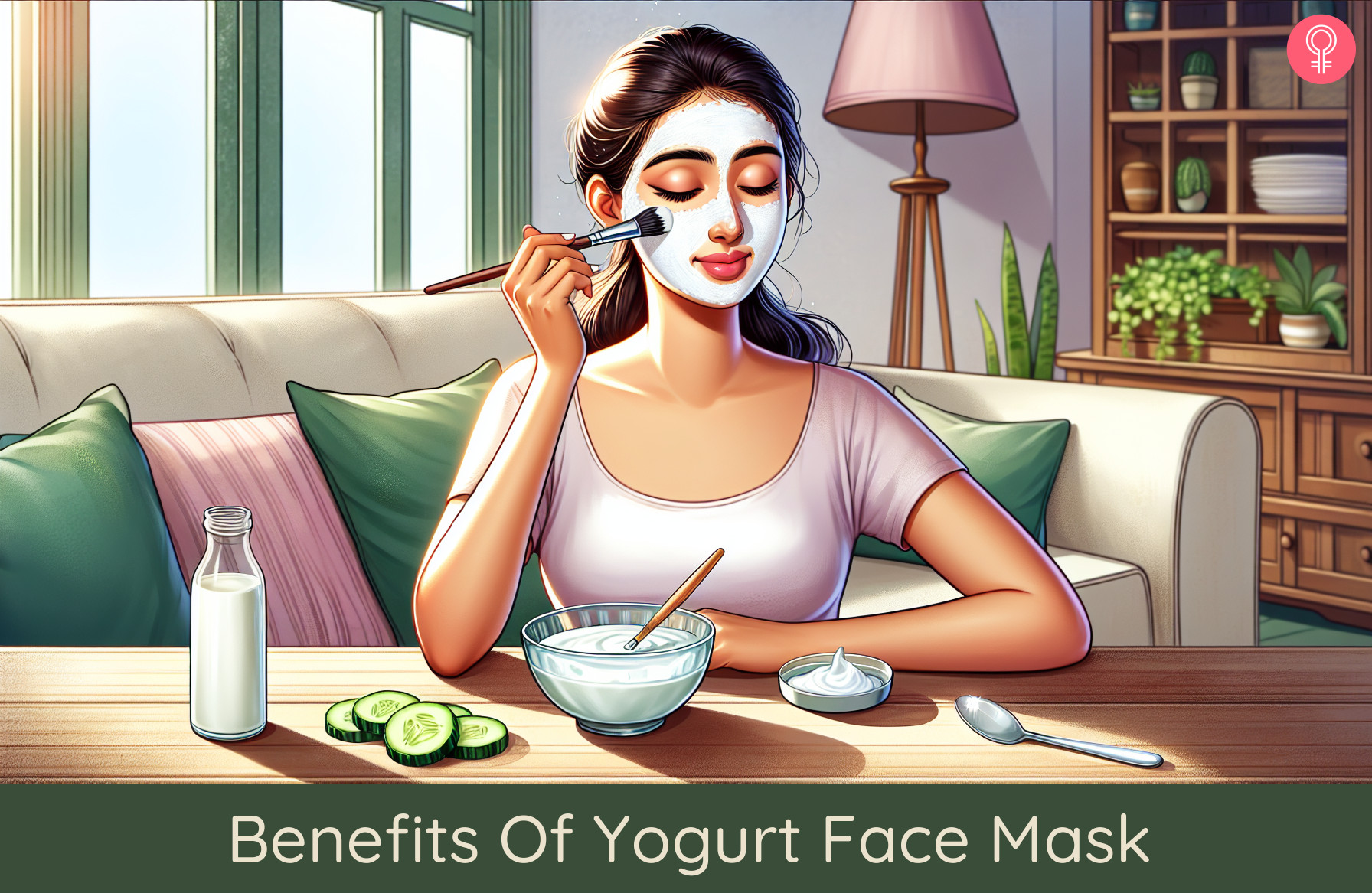
Image: Dall·E/StyleCraze Design Team
Yogurt is highly beneficial for your skin and hair health! Check out this video to find out how you can use this food item to improve your skin and hair texture naturally.
Personal Experience: Source
StyleCraze's articles are interwoven with authentic personal narratives that provide depth and resonance to our content. Below are the sources of the personal accounts referenced in this article.
i. Brightening DIY Face Mask with Yogurt and Strawberrieshttps://medium.com/@jovana.ristic18.11/brightening-diy-face-mask-with-yogurt-and-strawberries-b97c84714adf
References
Articles on StyleCraze are backed by verified information from peer-reviewed and academic research papers, reputed organizations, research institutions, and medical associations to ensure accuracy and relevance. Read our editorial policy to learn more.
- The inhibitory effect of glycolic acid and lactic acid on melanin synthesis in melanoma cells
https://onlinelibrary.wiley.com/doi/abs/10.1034/j.1600-0625.12.s2.7.x - Lactic acid applications in pharmaceutical and cosmeceutical industries
https://www.researchgate.net/profile/Azzam-Aladdin/publication/292990722_Lactic_acid_applications_in_pharmaceutical_and_cosmeceutical_industries/links/56b4a1b008ae922e6c02042d/Lactic-acid-applications-in-pharmaceutical-and-cosmeceutical-industries.pdf - Clinical evaluation in acne
https://europepmc.org/article/med/6451126 - Determination of antioxidant activity of bioactive peptide fractions obtained from yogurt
https://www.sciencedirect.com/science/article/pii/S0022030211005571 - Contribution of volatiles to the antifungal effect of Lactobacillus paracasei in defined medium and yogurt
https://www.sciencedirect.com/science/article/abs/pii/S0168160514005467 - Clinical, immunological, anti-inflammatory and antioxidant roles of zinc
https://www.sciencedirect.com/science/article/abs/pii/S0531556507002458 - Skin Barrier and Calcium
https://www.ncbi.nlm.nih.gov/pmc/articles/PMC5929942 - Honey: A realistic antimicrobial for disorders of the skin
https://www.sciencedirect.com/science/article/pii/S168411821500033X - Honey in dermatology and skin care: a review
https://onlinelibrary.wiley.com/doi/abs/10.1111/jocd.12058 - Strawberry-Based Cosmetic Formulations Protect Human Dermal Fibroblasts against UVA-Induced Damage
https://www.ncbi.nlm.nih.gov/pmc/articles/PMC5490584/ - Turmeric and curcumin: Biological actions and medicinal applications
https://www.jstor.org/stable/24107978?seq=1 - Anti-Inflammatory Activities of Colloidal Oatmeal (Avena sativa) Contribute to the Effectiveness of Oats in Treatment of Itch Associated With Dry, Irritated Skin
https://www.researchgate.net/publication/271332623_Anti-Inflammatory_Activities_of_Colloidal_Oatmeal_Avena_sativa_Contribute_to_the_Effectiveness_of_Oats_in_Treatment_of_Itch_Associated_With_Dry_Irritated_Skin - Study On Avocado Oil Quality, Its Characteris And Composition
http://dr.lib.sjp.ac.lk/bitstream/handle/123456789/5429/Study%20on%20avacardo%20oil%20quality,%20its%20characteristics%20and%20composition-001-015.pdf?sequence=5





